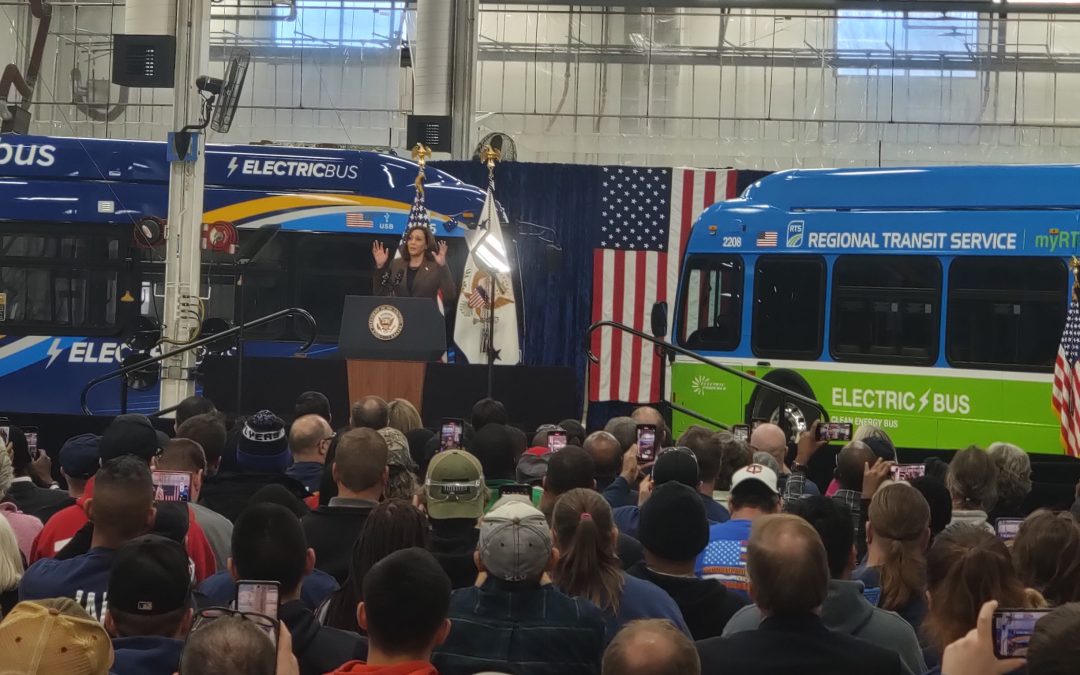Article Written by Edison Jensen. Photo by Edison Jensen.
In his 2023 State of the Union Address, President Biden touted his administration’s efforts to create sustainable, good-paying, union jobs. Since the signing of the Inflation Reduction Act last August, the advocacy group Climate Power estimated an increase in 100,000 clean-energy jobs.
Two days after that speech, Vice President Harris visited St. Cloud, Minnesota to recognize the electric buses from New Flyer – the largest bus manufacturer in North America. Gathered on their own factory floor, New Flyer employees warmly welcomed VP Harris as she took the stage, teasing it was time for a shift change. Her speech focused on the renewable-energy policy of Minnesota along with the commuter bus experience. She explains how contemporary buses are powered by diesel; their exhaust is a pollutant and a poison. Harris described electric buses as “key” to the future of public transit, remarking Congress has put $5.5 billion towards deploying thousands of electric buses across the nation. Madame Vice President Harris was impressed upon learning New Flyer’s electric buses have Wi-Fi and USB outlets. “You can charge your phone on your way home from work, that’s good stuff!” she exclaimed. Improvements like this, and the eventual efficiency of renewable-energy will save governmental expenditures according to Harris, which frees up money for other community priorities.
After speaking with an electric technician named Dustin, it became clear that New Flyer’s electric bus manufacturing will face economic challenges moving forward. Lithium, microchips, and electric-grid infrastructure will present limitations – and possibly increases in price. These electric buses typically retail for $600,000 to $1,000,000 from 35 to 60 feet long. Dustin expressed some doubts about the immediate future of electric buses, saying: “hybrid alternatives might be more cost-effective for some cities”. Eventually, though, he agreed with Harris: a hopeful future of cheap fares, long-range, and no pollution will come. New Flyer has positioned itself to be prepared for that future.
The New Flyer, St Cloud facility has many unionized workers, as Vice President Harris explained in her speech. The Biden-Harris administration has routinely focused on recent job creation including unionized workers. The future of electric vehicle (EV) technology will contain fierce competition under economic and climate-related pressures. Because of this, granting workers’ voices within private structures is something policymakers tend to rightfully highlight. The United States has historically suppressed unionization efforts. Between 1964 and 2014, Minnesota union membership declined from 37% to 14.3% (NPR, 2015). This economic shift – especially for manufacturing jobs – disenfranchises the power of workers persisting today. Car manufacturers within Tesla (a premium EV manufacturer) violated workers’ rights according to the National Labor Relations Board (NLRB) when management decided pro-union insignia could not be worn within Tesla’s factory. On another occasion, the NLRB ruled Tesla’s CEO violated labor laws when suggesting workers would need to ‘give up’ Tesla stocks upon unionizing (CNBC, 2022). Avoiding these kinds of practices is a serious consideration for the future of manufacturing jobs, especially ones like New Flyer’s. Electric buses are poised – especially with $5.5 billion more in national funding – to be a job-generator throughout the country. Employment is spurred from the driver, the commuter, the manufacturer, the supplier, and even the advertising on the side. If these jobs are secured through ethical labor conditions: a sustainable, environmentally friendly, community-building form of employment will be available to tens of thousands of Americans – and will be forever.






Recent Comments